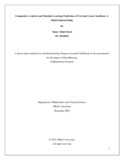Comparative analysis and machine learning predictions of cervical cancer incidence: a multi-national study
Abstract
This proposal presents a comprehensive investigation of cervical cancer frequency and patterns,
with a focus on a multi-national perspective, particularly highlighting the circumstance in
Bangladesh. Utilizing a mix of auxiliary information survey, comparative investigation, and
predictive modeling, this study sheds light on the worldwide landscape of cervical cancer,
emphasizing disparities in rate, screening hones, and healthcare framework. The inquire about
utilizes machine learning calculations, especially linear regression, to extend future patterns of
cervical cancer in Bangladesh up to 2050. Moreover, an in-depth examination of statistic, clinical,
and treatment characteristics of 223 cervical cancer patients in Bangladesh offers basic bits of
knowledge into components affecting results. Key discoveries uncover noteworthy fluctuations in
treatment and discovery techniques over nations, underscoring the requirement for more
harmonized worldwide healthcare approaches. The predictive analysis indicates a potential
stabilization in cervical cancer cases in Bangladesh, suggesting a positive trend due to ongoing
healthcare efforts. This proposition contributes to the existing body of information on cervical
cancer, giving profitable bits of knowledge for healthcare arrangement definition and execution,
especially in resource-limited settings.

